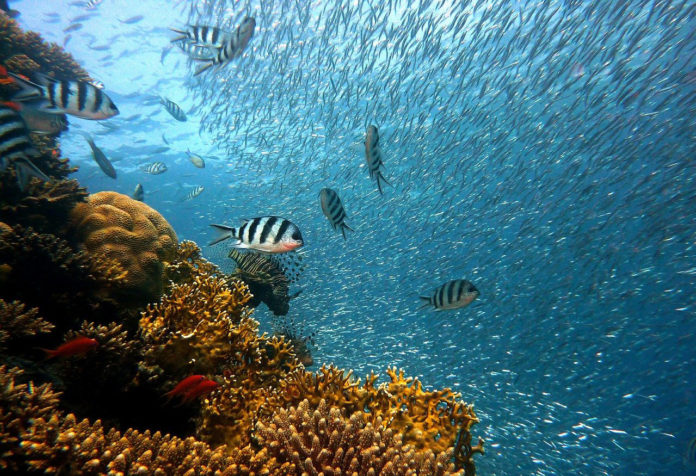Climate change and local anthropogenic stressors are causing unprecedented damage to coral reefs globally. Taking active steps to maintain healthy fish communities will be vital in reversing reef degradation.
Fishes perform a diverse suite of critical functional processes, meaning that damaged reefs have a higher chance of recovery if they have healthy fish populations.
Recently, scientists from the UK’s University of Exeter and Bristol, and Australia’s James Cook University and Australian Institute of Marine Science have taken a step forward to counteract degradation. According to them, fishes can be drawn to degraded coral reefs by loudspeakers playing the sounds of healthy reefs.
In a six-week field experiment, scientists placed underwater loudspeakers playing healthy reef recordings in patches of dead coral and found twice as many fish arrived – and stayed – compared to equivalent patches where no sound was played. They demonstrated that playback of healthy reefs sound could increase fish settlement and retention to degraded habitat.
Lead author Tim Gordon, of the University of Exeter said, “Fish are crucial for coral reefs to function as healthy ecosystems. Boosting fish populations in this way could help to kick-start natural recovery processes, counteracting the damage we see on many coral reefs around the world.”
Senior author Professor Steve Simpson, also of the University of Exeter, said, “Healthy coral reefs are remarkably noisy places – the crackle of snapping shrimp and the whoops and grunts of the fish combine to form a dazzling biological soundscape. Juvenile fish home in on these sounds when they’re looking for a place to settle.”
“Reefs become ghostly quiet when they are degraded, as the shrimps and fish disappear, but by using loudspeakers to restore this lost soundscape, we can attract young fish back again.”
Australian Institute of Marine Science fish biologist Dr. Mark Meekan added: “Of course, attracting fish to a dead reef won’t bring it back to life automatically, but recovery is underpinned by fish that clean the reef and create space for corals to regrow.”
Broadcasting healthy reefs sound doubled the total number of fish arriving onto experimental patches of reef habitat, just as expanding the number of species present by 50 percent.
Professor Andy Radford, a co-author from the University of Bristol, said: “Acoustic enrichment is a promising technique for management on a local basis. If combined with habitat restoration and other conservation measures, rebuilding fish communities in this manner might accelerate ecosystem recovery.”
“However, we still need to tackle a host of other threats, including climate change, overfishing, and water pollution, to protect these fragile ecosystems.”
Journal Reference
Gordon, T.A.C., Radford, A.N., Davidson, I.K. et al. Acoustic enrichment can enhance fish community development on degraded coral reef habitat. Nature Communications 10, 5414 (2019). DOI: 10.1038/s41467-019-13186-2
